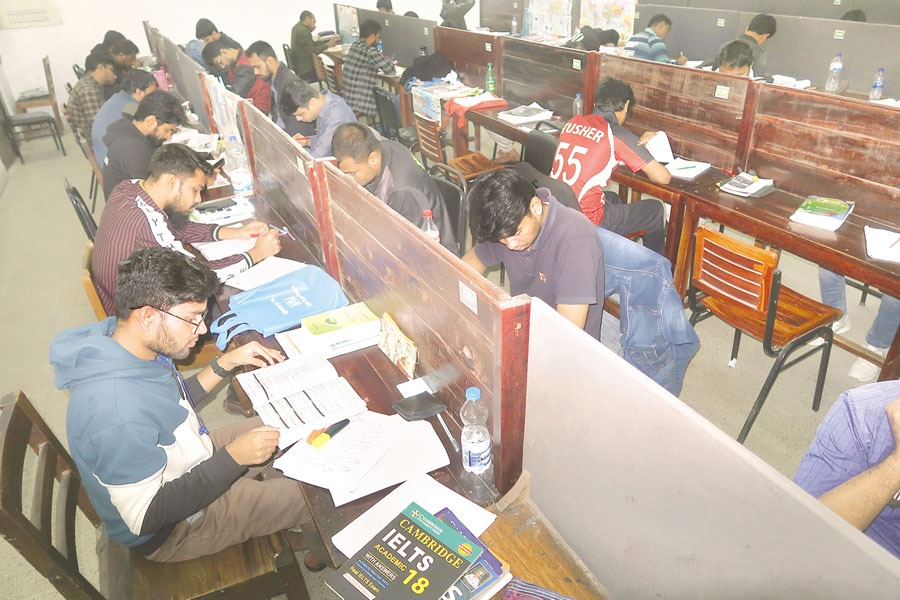
Published :
Updated :

Of the 106 private universities in Bangladesh, 28 had no allocation for research. The annual report of the University Grants Commission (UGC) of Bangladesh for the year 2023 has revealed this disquieting development. Even the funds other varsities set aside for the purpose were too little. Some of those highest seats of learning reportedly spent in the range of Tk 5,000 to Tk 40,000. The highest expenditure made by the BRAC University amounted to 60.43 million only. In 2022, as many as 85 universities had provision for expenditure on research.
The 2023 saw the number drop but remarkably, the overall expenditure on this head surpassed that of the previous year. As against the expenditure of Tk 1,393,148,000 in 2022, the amount went up to Tk1,650,085,000 in 2023. This is a clear indication that the passive attitude towards research and innovation by some of the universities was counterbalanced by others to some extent. Yet it must be admitted that this is cold comfort for not only private universities but also the public ones.
Even the premier and the highest Quacquarelli Symonds (QS) ranked University of Dhaka placed at 584th position, has only Tk 2.157 million allocation for research in its 2025-26 fiscal year. This accounts for 2.08 per cent of its annual budget ---a slight increase from the previous year's 2.07 per cent. Credit goes to faculty members and researchers of the DU for making it to the list of the world's top 2.0 per cent scientists 2025. As many as 35 academics earned this distinction---25 more than only 10 of them in 2024. With limited fund and facilities, the faculty members have worked wonder by their dedication to study and research. When the university is making screaming headlines for activities unrelated to academia, there are still faculty members who go on working silently in pursuit of furthering the horizon of knowledge and making a breakthrough on the research front.
Now other universities should follow suit. The deplorable ranking by Bangladesh universities is not for nothing. Indifference to scholarly pursuit is certainly to blame for lower grading. One of the prime reasons for neglecting research is the commercialisation of education. Privatisation of higher education has given some privileged quarters a great opportunity for making quick bucks. A few of such universities earned infamy for issuing certificates without following the rigorous course of teaching, training and assignments, let alone dissertations. This kind of scams vitiated the higher education regime.
There is a clear mention of allocation for research in the Private University Act, 2010. The UGC also failed to get its acts of monitoring and supervision together. Of late, the UGC authority has increased its monitoring and drafted guidelines in order to ensure transparency and accountability in the expenditure of research funds. Yet, it falls short of what needs to be done in creating an atmosphere for competition among universities in outlaying money for advancing research programmes. Funds made available for research are certainly not enough.
The government alone cannot offer enough funds even to the reputed public universities. There is a need for collaboration between such universities and the corporate world. With the climate change taking a heavy toll on life and livelihoods, indigenous research has become a sine qua non. Research programmes and technology transfer that take place, according to experts, are a decade old in most cases. Also the special geographic position and conditions vary widely. Therefore many countries have put emphasis on local research aimed at addressing such specific problems encountered by them. Bangladesh cannot afford a long wait for solution to its problems and rely on developed countries to do the task for it.
It is because of this academic and industrial/business collaboration should be more intense and positive. Let the talented pool of human resources have an enabling environment here. Instead of leaving the country for developed ones, they can chase their dreams in the land of their birth. Satyendra Nath Bose made his ground-breaking discovery at a time when the DU had hardly any facility for research. Now that Bangladesh has come a long way off in terms of progress in business and industrial ventures, pooling research funds ought to be a wise option to the mutual benefit of all concerned.
nilratanhalder2000@yahoo.com


 For all latest news, follow The Financial Express Google News channel.
For all latest news, follow The Financial Express Google News channel.